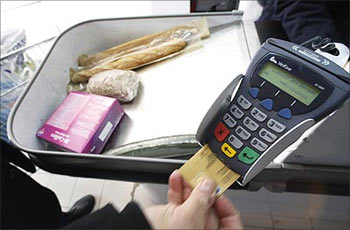 | « Back to article | Print this article |
'Customer should be the King'
An alumnus of Faculty of Management Studies (FMS), Arun Thukral, managing director, Credit Information and Bureau of India Ltd, had an impressive career spanning across 30 years. Passionate about managing financial risk, Thukral is actively involved in educating and training of banks, financial institutions, housing finance companies, state finance companies to follow financial discipline, adopt and integrate risk management tools in their internal processes, in order to mitigate risks. He strongly believes credit information facilitates credit penetration and success of the financial inclusion policy.
In a freewheeling interview with Harsh Roongta and Bienu Vaghela of Apnaloan.com, Thukral says, "It's high time that we accept the fact that Indian culture of savings helped India come out unscathed out of the worst financial turmoil."
Excerpts:
Globally, credit bureaus have played a critical role in the development of credit markets by providing information on the credit history of the consumers' past repayment pattern. Now few more players are eyeing the Indian credit market. Please comment.
We have based our working on the US model as we have partnered with TransUnion, which is one of the oldest players in this field. Considering the market as big as US, there are only three major bureaus: TransUnion, Experian and Equifax, which are globally big. Then there are few small regional players. Now many are looking to come to India, as they prefer India for variety of reasons. I believe that competition is good. Customer should be the King. He or she should have choice. Not only this, competition also leads to industry expansion.
What does competition bring to the table?
I cannot specifically say that what these players are going to bring to India. If you study the industry globally over the years, you will know that there are multiple credit bureaus operational in most countries. But you need history of at least 2 to 3 years to come up with predictive risk zones. Our technical partners are Dun & Bradstreet and TransUnion. TransUnion has their own scores in many countries that are their proprietary scorecards.
Note: Scorecards are standard formulas devised by credit information companies for deriving a credit score for a consumer, which indicates the risk of his defaulting. Higher the score less are the chances of the customer defaulting.
What role do you see for credit bureau in India particularly CIBIL?
The basic objective of CIBIL is to create a sound lending culture and ensure that financial environment of the country remains healthy, which works in favour of the consumer. Today credit penetration in India is only around 15 per cent so there is enough scope for expansion. One should appreciate that running a credit bureau in India is like running a credit bureau for the entire Europe. In India when we get data from the lenders it is in free flow data format because of so many variations in names, surnames and addresses etc. Implementing validation process is the biggest challenge.
As far as our role is concerned, credit information companies collect loan repayment data from various lenders, which become available to any lender whom the consumer approaches for fresh credit. This data from the CIC ensures that prospective lenders get to know the total borrowings made by the consumer in the past as well as their repayment track record. Therefore consumers who have taken care to pay their installments in time benefit by getting loans quicker and at better terms, whereas the consumers who have defaulted in the past have to pay higher rates or are denied credit facilities.
We started with database of 4 million with 13 members in 2004 and have grown to 164 members and database of over 135 million trades. The number of corporate loan account information is over 2 million today, which we launched in 2006 with half a million database. This way we can say that credit information industry has evolved but challenges are also there.
'Credit history in India is neither positive nor negative'
Mostly credit history is taken into consideration for negative reasons, that is, to deny the credit. It is rarely used to give better rates or faster sanctions to customers with good credit track records. Please comment.
I beg to differ here. It is 'just' credit history here in India, neither positive nor negative. Our score is in the range of 300-900; it is better towards 900 as there is less risk. An aggressive lender may give credit with a score of 600 points whereas a conservative bank may take 700+ score as benchmark. But it is never used to stop credit. If that were the case, then the retail growth, which we have witnessed in the last few years, would not have happened. Australia, which is a very developed economy, does not capture positive history (Note: Loans on which consumers have paid on time), it captures only negative history (Note: Loans on which consumers have delayed/defaulted on their obligations).
In fact owing to information from CIBIL, banks can now process loans faster and make prudent lending decisions. Credit information bureaus actually aids credit penetration.
Till now CIBIL was following closed-door policy towards the consumers. Now your website mentions that RBI has provided for the right of the consumers to their own credit reports. When these will be available to the consumers?
Normally people do not ask for the report except when their credit gets declined. Now we have recently started a customer cell, which caters to the customer's complaints. We have a database of over 135 million, which is fully automated. Till now we function with a close-user group of 164 members on the principle of reciprocity.
But if a consumer's loan gets declined on account of his/ her CIBIL report, the borrower can get a copy of the report from the concerned lender. However getting your credit report may be possible at the end of this financial year.
If there is still an issue, CIBIL will attempt to contact the lending institution on the basis of a borrower's query. A nine-digit control number with the lender who requests for the credit report helps identify the report.
We receive representations from consumers that banks refuse to share credit report even if they decline credit. Is there any redressal mechanism, which directs its members to adhere to undertaking to share the credit report with consumers?
CIC Act requires members to share the borrower's credit report with him/ her in case of a loan decline. Borrowers can get details of their credit report from CIBIL by contacting our consumer information cell and quoting the nine-digit control number as also providing proof of their identity (Note: Identity theft is when another person uses your personal details obtained by them illegally to pose as you and take credit/commit fraud in your name). In case of difficulty in getting this control number from the lender, they can still approach the consumer cell in CIBIL with all the details such as which bank requested for their credit report, approximate date, etc. and CIBIL's cell will endeavour to assist the borrower in getting the report details.
'We are working to educate our customers'
The awareness about role of CIBIL is quite low. Why?
The reason for this is that we have not gone to the consumer directly. Our customers are financial institutions, NBFCs and banks and we have been interacting with them only. But we have expanded our reach by regular presence in media. Now we are working on consumer education plan to educate our customers.
There is general reluctance to share credit reports with consumers. How do you explain that?
CIBIL works on the principle of reciprocity. This means that only institutions that share information with CIBIL can access information from it. Today when the opportunity is opening up (Note: Under the Credit information companies act it will be mandatory to share the consumer's own report with him), the value will be added as we go directly to the customer. Quality of data, which is our lifeline, will also improve. We are already in the process of implementing the legal changes, which are required by the CIC Act. This way the complete format is undergoing a change. Now we need a window to solve what all is disputed which will be open to both CIC and the lender for 30 days.
Please tell us about the infrastructure being put in place for reaching out directly to customers.
You will appreciate that talking direct to customer is a project by itself for which we have to have people trained to answer the enquiries and we need a BPO for that. Then process of validation also needs to be worked on. We will have a separate cell to deal with customers, as it will involve disclosures and disputes etc. We are in the process of developing technology and infrastructure to support this process and we will take sometime to finalise and implement this.
Would you like to give a message to our consumers?
Credit Information Bureaus help credit penetration by providing objective information on borrowers to the lending institutions. CIBIL aims at creating a sound lending culture in the country by helping both the borrowers and the lenders in the process of credit transaction. Financial discipline and sensitivity in repaying of loans will not only aid in accessing credit at better terms but also contribute in the growth of the country's economy.
Apnapaisa is a price comparison engine that allows consumers in India the ability to compare the EMI, , interest rates and other fees for home loans , car loans , personal loans , business loans , credit cards , compare online quotes and features of life insurance , health insurance , car insurance , travel insurance and other general insurance policies in India.


